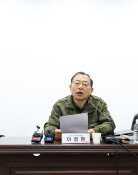Mass Transit Fares to Increase 12.5%
Mass Transit Fares to Increase 12.5%
Posted November. 24, 2006 06:50,
Public transportation fares in Seoul will increase significantly starting February 2007. The standard fares for both subways and buses will rise 12.5 percent each on average.
The fare for metropolitan buses connecting Seoul, Gyeonggi and Incheon areas will go up 21.4 percent, and an extra charge depending on distance will increase as well under the new subway fare system. Hence, those who commute a long distance to work are expected to suffer most from the increased fare. For instance, people who take the subway from Ori Station in Bundang to Seoul City Hall Station to go to work will have to pay 3,000 won for a round trip, a 25 percent increase from the current 2,400 won.
The plan to increase public transportation fares is the first of its kind in 31 months since the municipal government revised its public transportation system plan in July 2004.
Seoul decided to augment the standard bus fare from the current 800 won to 900 won, and levy penalty fare of 1,100 won, 200 won up from the present charge, on passengers who pay the bus fare in cash. The move is part of the citys attempt to discourage payment of fare in cash, which incurs more costs. Moreover, the fare for metropolitan buses, which are operating in the red, will be raised 21.4 percent from 1,400 won now to 1,700 won. The extent of the increase in town bus fares will be linked to other bus fare increases.
The subway fare increase will be greater: the standard fare for a subway ride will rise 100 won, but the fare computation system for extra distance charges will change from the current additional 6km to an additional 5km. The distance that the standard fare will apply to will be shortened, while an additional 100 won will be imposed per 5km, increasing the fare burden on users.
Regarding this, Seoul City noted, If we take into account increases in standard fares and changes in the subway fare computation system, subway fares will rise by 15 percent.
While Seoul City explained, The fare increase was inevitable because of our poor balance sheet, critics say that it did not make sufficient effort to reduce the prime cost of transportation. They point out the city is trying to make up its deficit with a sharp fare hike of 12.5-25 percent, a figure far higher than the 3 percent inflation rate.
Seoul City announced that the Seoul Metro and Seoul Metropolitan Rapid Transit Corp. would strive hard to cut costs by 35 billion won every year. But it remains to be seen whether its plan will be successful as an agreement between labor and management is necessary as a precondition.
Seoul City plans to revise the public transportation fares after listening to the ideas of the Seoul Metropolitan Council and referring the matter to a deliberation of the Price Control Committee.
esprit@donga.com







